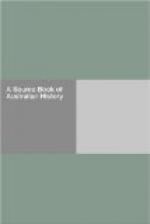To the peoples of Europe the thought of war was ever present in the popular mind; but to the Australian, born and bred in an atmosphere untainted by war, living amid peaceful surroundings and desirous of remaining on terms of friendship with the rest of mankind the word itself has a jarring sound. Yet the German challenge to the Mother Country finds 233,720 of her Australian sons who have voluntarily wrenched themselves from their parents, wives, and friends, and from comfortable and cheerful homes, to answer the call of their country to fight the Empire’s battles on distant shores.
Nor has the thunder of the cannon been necessary to inspire Australians with a conception of their duty; and the explanation of it all is that we have inherited to the full that spirit of our forebears which enabled them, not so long ago, to tear themselves from homeland firesides to shape careers in this great island continent, and to overcome with indomitable pluck the awful hardships of a pioneering life.
For generations to come the story of the entry of the Australian troops to the European battlefield will ring in the ears of English-speaking nations. The chronicler of the future will provide many thrilling pages of history, magnificent material for the moulding of the youthful Australian character.
A distinguished military officer told us before the war that Australians would require to be in the majority of two to one in meeting a foreign foe on our own shores; but the furious onslaught that accompanied the landing at Gallipoli, the bitter fighting and terrible trials of the occupation, and the wonderful skill that made possible the bloodless evacuation have shown us that the Australians carried out a feat of arms not excelled by the most highly-trained regulars of any nation of the world. The following messages are eloquent in their tribute to Australian bravery:
“I heartily congratulate you upon the splendid conduct and bravery displayed by the Australian troops in the operations at the Dardanelles, who have indeed proved themselves worthy sons of the Empire.”—His Majesty the King, April 1915.
“The capture of the positions we hold will go down to history as a magnificent feat of the Australians and New Zealanders.”—General Sir William Birdwood, November 1915.
“Happen what may, the Australians who have fought at Gallipoli will bequeath a heritage of honour to their children’s children.”—General Sir Ian Hamilton, November 1915.
These are examples of the praise which that feat of arms has won, and such is the standing of military bearing which the improvised army of Australian citizens has set up for the citizen army of Australia—a standard which, we may rest assured, has not failed to impress our enemies in computing the military value of our forces.
Every unit of the citizen army will now have its tradition. Every soldier of the Australian army will have that inspiring example of the Anzac heroes to live up to in his military work, and we can regard the future with a calm confidence in the military prowess of our soldiers.




